Did you know that coffee and houseplants can go hand in hand? Coffee has long been used in gardens both indoors and out to increase the amount of nutrients in the plant’s soil organically.
The nutrients found in coffee can improve the overall structure of the soil, while also moderating the soil temperature and balancing its pH levels.
But not all plants are created equally and some houseplants don’t do well when they are fussed over. So, what about pothos? Do pothos like coffee grounds?
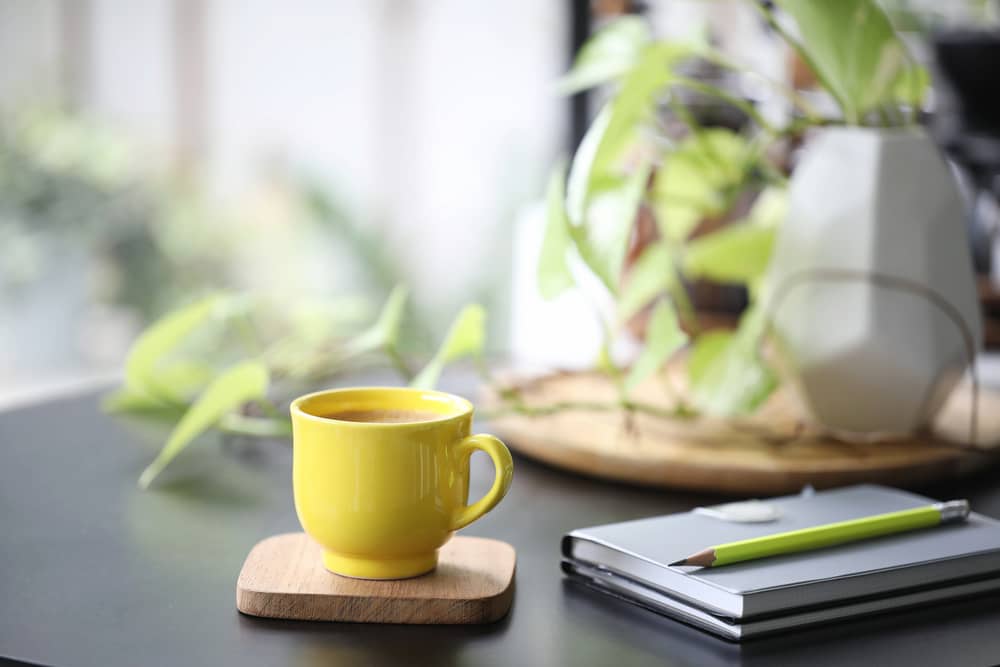
Table of Contents
Do pothos like coffee grounds?
Yes, pothos like coffee grounds. In fact, when used correctly, coffee grounds can be a wonderful soil additive to pothos that works as a natural fertilizer. The key, however, is to ensure you add coffee grounds to your pothos the right way to help prevent accidentally damaging the plant.
Using coffee grounds to improve the health of plants is not something new. People have been adding used coffee grounds to their compost piles for years, and some even avoid the compost pile completely and utilize their used coffee grounds as soon as they are finished with them.
Even though coffee grounds can be beneficial, applying too much can cause adverse reactions to your pothos. In fact, adding the incorrect amount of coffee can cause the soil to become too acidic, which can severely harm the plant. That is why it is important to test the soil’s pH level first to know what the current acidity is.
FYI: The best way to do that is with an at-home soil pH test kit (you can check the current price of our preferred one here) which will let you know straight away if you’re good to go or not.
How to give coffee grounds to your pothos
There are a few different ways you can add coffee grounds to your pothos, such as a compost tea. Remember, however, that coffee grounds can dry out the soil, so make sure to water the pothos within 48 hours after using the coffee grounds.
1. Soil additive
The quickest way to utilize coffee grounds is to simply mix it into the pothos’ soil. Incorporate the coffee grounds into the soil, making sure that the coffee grounds make up between 10 and 20 percent of the total soil.
Using coffee grounds as a soil additive can be difficult if the pothos plant is already planted into the container or ground. This method may be better left for pothos that have yet to be planted in a container or used when you are repotting a pothos that has outgrown its current container.
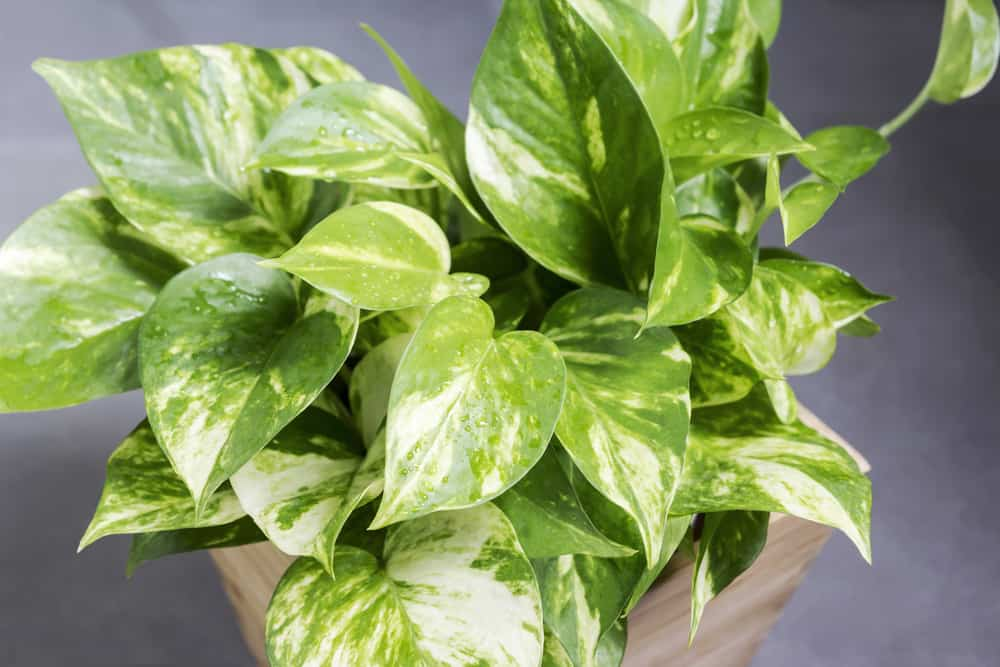
2. Compost tea
Compost tea is made in the same manner as if you were brewing a cup of tea. Simply fill a sock with used coffee grounds and then tie the sock close. Toss the sock in a bucket of water and let the tea steep for several days, the longer the “tea” steeps, the stronger it will be.
After the time has passed, remove the sock and then water the pothos with the compost tea.
Keep in mind: Remember to avoid overwatering the pothos. If the soil still feels damp, wait a day or two to check again and then only water the pothos with the compost tea when the soil starts to feel dry.
3. Water additive
If you want to use the compost tea method but don’t want to wait several days, you can simply mix 2 cups of used coffee grounds with 5 gallons of water. Allow the mixture to sit overnight and then water the pothos with the diluted coffee mixture.
As with the compost tea, only add the coffee water to the pothos when the first few inches of soil feels dry. Watering when the soil is still damp or soggy will increase the chance of root rot in your pothos and other fungal diseases.
4. Mulch
Coffee grounds can also be added to mulch and then spread around the plant’s soil. If you use this method, make sure to keep the mulch a few inches away from the base of the pothos, since spreading mulch up against the stem of any plant can increase the chance of diseases and problems.
To use coffee grounds as a mulch, spread ½ inch of coffee grounds on the soil and then add 4 inches of mulch. Use your hand or a rake to mix the two together and break up any clumps.
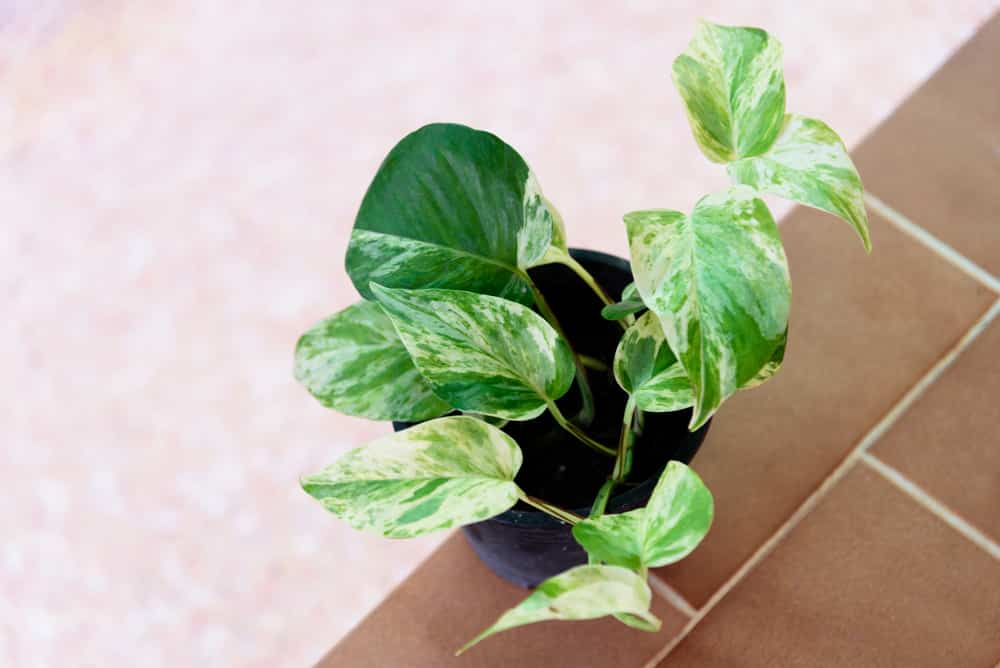
How much coffee grounds should you add to your pothos?
When mixing coffee grounds into your pothos’ potting soil, you want to add enough coffee grounds so that it makes up 10 to 20 percent of the total soil. This can be repeated every two to three months during the plant’s active growing season.
That said, the amount of coffee grounds you should add to your pothos depends on what method you use to introduce the coffee to the plant. Each method has its own suggested usage amounts that aim to give your pothos all the benefits of coffee grounds with little risk.
As for compost tea, there is no real amount required since it depends on the size of the bag you are using. Simply fill a sock, piece of cheese cloth, mesh bag, or other similar material with compost and tie close.
How often should you add coffee grounds to your pothos?
Coffee grounds can be used in the same manner as fertilizer, so keep that in mind when deciding when to use this additive. Fertilizers of all kinds are typically only applied to the pothos during its growing season, which is spring to fall. During this growing period, apply the coffee grounds to the pothos once every two to three months.
Remember to stop using all types of fertilizers, even coffee grounds, once the pothos goes into its dormant period, which is in the winter. Fertilizing pothos when they are dormant will only put the health of the plant at risk and does nothing to benefit the pothos.
Pro tip: A good general rule of thumb is to use coffee grounds no more than two to three times during the growing period. This will help prevent overfeeding the pothos, which can occur with any fertilizer if applied too many times.
Benefits of coffee grounds for your pothos
There are many different benefits to giving coffee grounds to your pothos. After all, if it didn’t provide any positive aspects, what would be the point of adding it? Let’s take a look at the benefits that coffee grounds can provide to pothos.
1. Add nutrients
Coffee grounds contain a slew of minerals that, when added to the soil, can help improve the health of the pothos. Think of coffee grounds as a natural alternative to commercially available fertilizers, since it does about the same thing.
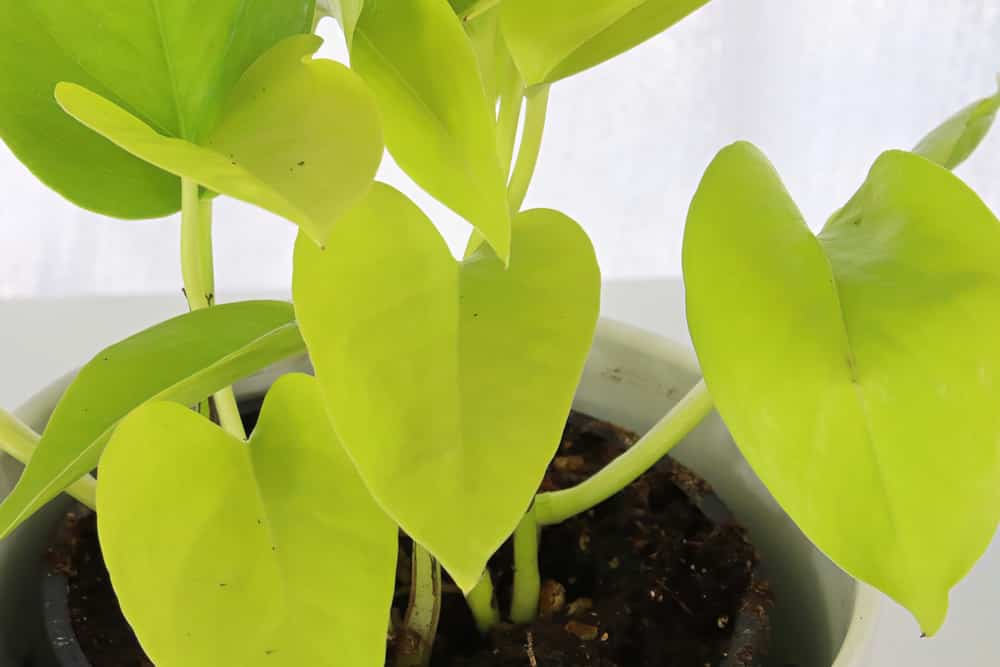
2. Soil improvement
Coffee grounds can help improve the soil’s ability to retain water, which means it prevents the soil from drying out too quickly. If applied in the right amount, coffee grounds can also improve the drainage and aeration of the soil.
3. Protection against pesticides
Pesticides are a common resource that many gardeners use to control the insects that attack plants. Unfortunately, the residue that these chemicals can leave behind can actually be harmful to pothos. This is where coffee grounds come in handy.
Coffee grounds can bind the toxic residue and keep them in one location. This prevents the residue from severely damaging the pothos. If you have recently used pesticides on your pothos, adding used coffee grounds can help.
4. Increase nitrogen
Coffee grounds will naturally improve the nitrogen level in the soil. Nitrogen plays a vital role in the health of pothos, and it is essential for the growth of the plant. Without nitrogen, healthy stem and leaf growth wouldn’t occur.
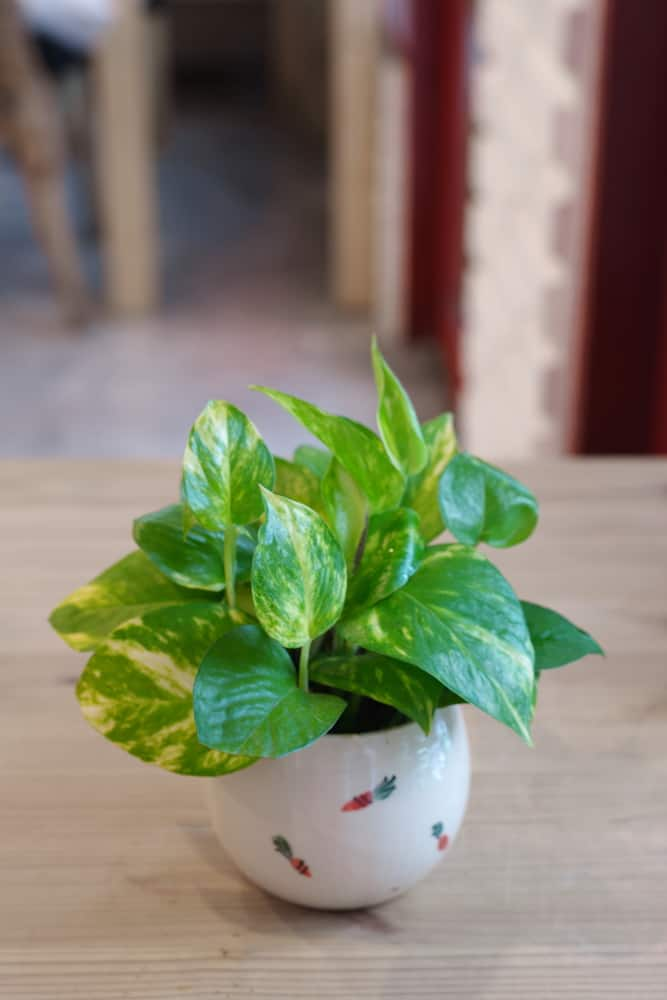
5. Protects roots and soil temperature
Coffee grounds can be used as a mulch around the pothos to help maintain a consistent soil temperature and protect roots from extreme temperature fluctuations.
6. Balance pH level
Coffee grounds are a bit acidic and adding them to soil that is too alkaline will help balance its pH levels. Keep in mind, however, that you should check the soil’s pH level before adding coffee grounds. This will give you an idea of what the current pH is.
7. Deter animals
Coffee grounds, even when used, can have a strong odor that some animals do not like. Sprinkling some used coffee grounds around the base of the pothos can help keep animals away from the plant.
Related: Are Pothos Toxic to Dogs (and What to Do If Your Pet Eats One)?
Possible problems with giving your pothos coffee grounds
Even though adding coffee grounds to your pothos does provide various benefits, there are some possible problems that could occur. These problems include changing the soil texture and increasing the chance of fungal diseases.
1. Changing soil texture
Coffee grounds can change the overall texture of the soil and can even make it more clay-like. What this means is that your once well-drained soil can start to prevent the water from draining properly. This can result in your pothos being overwatered which can lead to a bunch of other problems.
Thankfully, you can help reduce the chance of this happening by using the bare minimum of used coffee grounds or using coffee grounds in compost tea instead of incorporating them directly into the soil.
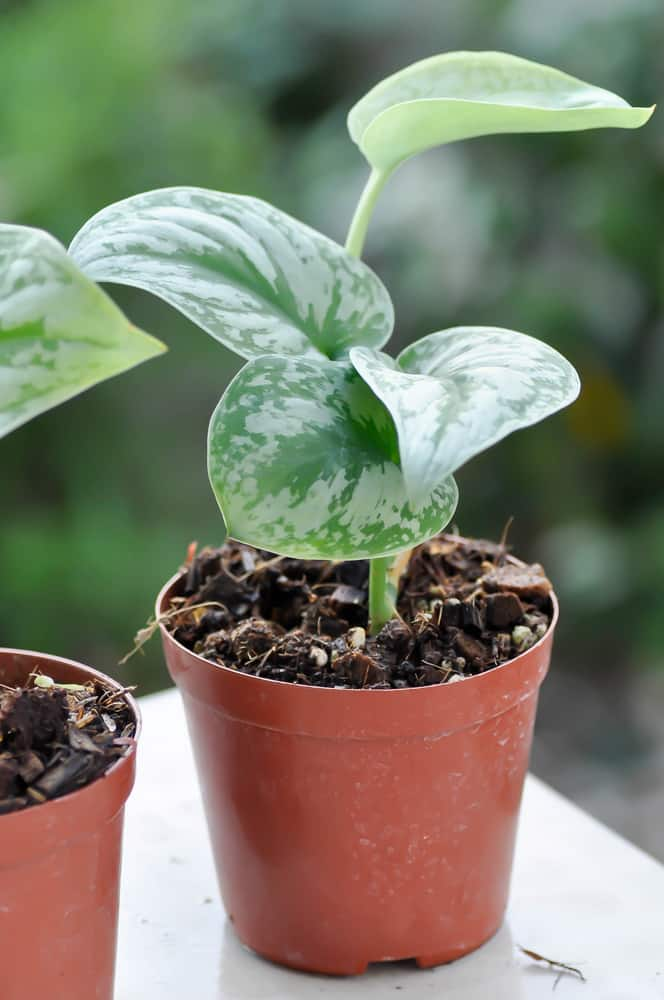
2. Harm young plants
While coffee grounds can be beneficial for mature pothos, young plants can quickly become damaged by this organic fertilizer. Because coffee grounds make the soil more acidic, it can interfere with the young plant’s ability to grow properly.
Additionally, avoid using coffee grounds on plants that are weak, unhealthy, or diseased as they can cause the plant to quickly decline.
3. Increase acidity
Increasing the acidity level of the soil can be a good or bad thing, depending on the pH level of the soil. The ideal soil pH for pothos is 6.1 to 6.5, so if the soil is too alkaline, adding coffee grounds can help naturally decrease that pH level. Unfortunately, if the acidity is already at or near the optimal pH level, adding coffee grounds could lower it too much and result in damage to the pothos.
4. Hard soil
Adding too much coffee grounds to the soil will cause it to become much harder as it dries. This alone can impede growth, while also preventing water from draining properly. And, as you know, when the water cannot drain properly, the chances of overwatering and root rot occurring greatly increases.
That is why coffee grounds should be used sparingly and not in abundance. Using the minimal amount of coffee grounds will help reduce the risk of the potential side effects associated with using coffee grounds on pothos.
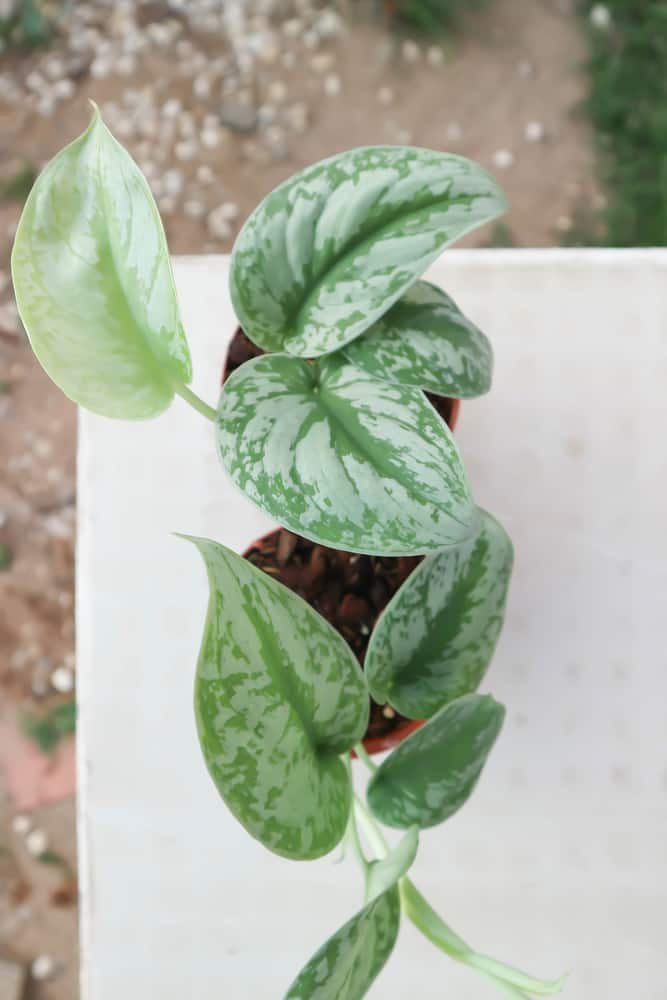
5. Fungal diseases
Coffee grounds help soil to retain moisture, which can be a blessing and a curse. While you do want your potho’s soil to retain some moisture, too much can increase the chance of the plant developing a fungal disease.
Thankfully, you can avoid this increase in fungal problems by using coffee grounds in a compost tea instead of directly incorporating it into the soil.
6. Antibacterial
For us humans, antibacterial properties are typically thought of as a good thing. However, not all bacteria is bad, but when something has antibacterial properties, it cannot distinguish between good and bad bacteria. Coffee grounds are an example of this.
When given to pothos, coffee grounds can kill off good bacteria that is essential for the overall health of the plant. Without these vital good bacteria, the plant’s growth will suffer.
Should I give my pothos coffee grounds?
Whether or not to give your pothos coffee grounds is really a personal preference. Some gardeners have had nothing but good results using coffee grounds, while others feel it is a waste of time at best and a problematic ingredient at best.
The truth is that each situation is different and there are a lot of factors that can have a negative, as well as a positive aspect to your experience.
Additionally, the actual reason why you want to use the coffee grounds is another factor that should be considered. Coffee grounds are not a cure all and should never be used on weak or unhealthy plants.
You may also be interested in: 12 Reasons Why Your Pothos Is Not Growing (and How to Fix It)
Do I use fresh or used coffee grounds?
A common question asked is whether or not to use fresh (non-brewed) coffee grounds or used (brewed) coffee grounds for pothos. You shouldn’t use fresh coffee grounds on plants because these non-brewed grounds are much more acidic than the used or brewed coffee. This means the chances of accidentally damaging the plant becomes much higher.
Unless you are using them on acid-loving plants, such as hydrangeas, you should avoid using fresh coffee in your garden.
While pothos like coffee grounds, giving this plant non-brewed coffee can quickly damage and discolor the plant’s foliage, while also interfering with its ability to grow healthy and strong.

Can coffee grounds be used on inside and outside pothos?
Both inside and outside pothos like coffee grounds, and this soil additive provides the same benefits no matter where the plant is grown. While pothos growing indoors have the same growing requirements as those in the ground, they don’t always share the same potential problems.
For example, pothos plants grown outside typically have to contend with more diseases and pest problems. Adding coffee grounds can help keep the outdoor pothos strong and ready to fight off anything that gets in its way.
Indoor pothos are more likely to be neglected and provided with the wrong type of care since these plants are growing outside and will need you to take care of them every step of the way. Coffee grounds can help ensure your indoor pothos get the nutrients they need while also improving water retention in the soil.
Should I test the soil pH level before adding coffee grounds?
It is recommended to always test your soil pH level before adding any amendments, like coffee grounds. Not only does this give you important information that you should know before adding anything to the soil, but it also gives you a base reading so you can then retest after treatment and see if it worked.
Far too often, gardeners assume their soil pH level is off balance and add unnecessary amendments, which end up having an adverse effect on their plants. If you test the soil pH level beforehand, you will have a better understanding of what the current level is and then you can treat it accordingly.
How do I test the soil pH level?
One of the easiest ways to test the soil pH balance is by using a do-it-yourself soil pH kit (you can check the current price of one here). The kit includes all the tools you need to quickly determine the pH level. Another option is to try a simple homemade soil test.
Place a sample of the soil in a container and then add ½ cup of lukewarm water and ½ cup of baking soda into the same container. If the mixture starts to fizz, then the soil is acidic. Extreme amounts of fizz or a severe reaction inside the container could mean the soil is too acidic. No reaction means the soil is more alkaline.
Keep in mind that the baking soda and water method isn’t as reliable as the soil test kit since it doesn’t give you an actual pH balance number.
